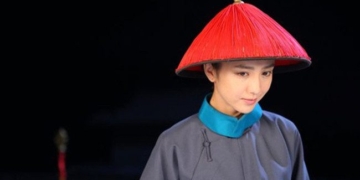Recognizing the communication challenges faced by the hearing impaired, an 11th-grade student in Quang Tri has developed a pair of translation gloves to help those less fortunate gain access to education and knowledge.
“Cắc cắc cắc tùng tùng tùng,” the sound of the school bell rings, and Tran Ngoc Long, an 11th-grade student at Le Quy Don Specialized High School (Dong Ha City, Quang Tri Province), hurriedly slings his backpack and heads to a room containing a device that has long been his dream.
No one would imagine that an 11th-grade student could independently program two artificial intelligence (AI) tools, integrating them into a device he researched himself—translation gloves—to enable individuals with disabilities (mute/deaf) to communicate like everyone else.
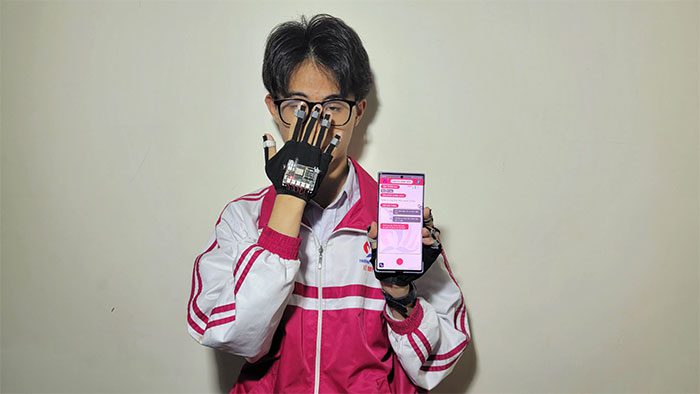
Tran Ngoc Long and AI gloves.
“I hope everyone can access knowledge”
Frequent visits to the provincial school for disabled children made Long aware that his peers were unable to communicate, learn, or acquire knowledge, which weighed heavily on his heart.
With a noble spirit, Tran Ngoc Long nurtured the idea of creating a communication device to assist those less fortunate than himself.
“I feel that disabled individuals suffer many disadvantages; to acquire knowledge and develop oneself, one must be able to hear and speak. If I were to become blind, I could still seek knowledge, but those who are born mute and deaf cannot do so,” Long shared.
Over six months ago, when he began the project, the student didn’t know where to start, coming from a place of zero knowledge. There were times he felt despair and considered giving up, but driven by the dream of helping disabled individuals, he persevered, diligently researching technology to improve his product.
Training Two AI Tools
At 2 AM, the city of Dong Ha lies in silence, and from a bedroom, the sound of typing can be heard as Tran Ngoc Long diligently sits at his computer, his fingers quickly executing programming commands. He is training AI to integrate into the translation gloves.
As a student specializing in Physics, Long had no prior knowledge of programming. Fortunately, he was guided by his IT teacher, Ho Van Lam, who shared essential skills and resources to help him operate commands on the computer.
“My programming knowledge started from scratch, and I am truly grateful to my teacher who taught me how to program so I could create my own AI tool and train existing AI software to suit the device and Vietnamese sign language data,” Long expressed.
“My name is… I am passionate about art,” the phrase echoes from a phone in a classroom at Quang Tri Provincial School for Disabled Children. A student in a bright red scarf, with an innocent face, is wearing gloves equipped with sensor chips.
This student, unfortunately, was born mute and deaf, and their hands are moving to perform sign language. With just a few gestures, the phone below produces an audio introduction of the student’s name and passion.
This is made possible by the translation gloves developed by Long. This product is an electronic glove that enables the deaf and mute to communicate naturally with others, functioning by converting sign language.
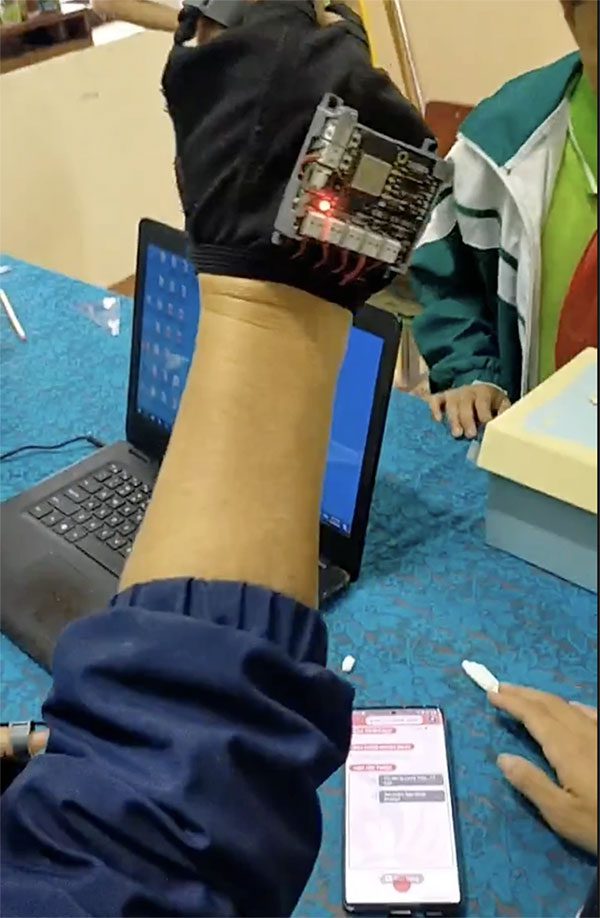
Long’s translation gloves equipped with sensors; he has trained the AI to align with the Vietnamese sign language lexicon, ensuring accurate translation from sign actions to spoken language.
It features many outstanding functionalities, accompanied by a mobile app for audio output and displaying communication content.
Notably, these gloves can facilitate two-way communication between hearing individuals and the deaf and mute in both English and Vietnamese. They convert discrete sign language gestures into complete sentences that align with natural language during communication.
Long’s product is equipped with curvature sensors, gyroscopic sensors, magnetic field sensors, and accelerometers.
These components measure the flex and stretch differences between fingers and voltage differences to create a data stream sent to a mobile application. Subsequently, AI transforms this data into a complete sentence.
However, the device initially encountered issues with trajectory errors in space. Long addressed this by creating an AI tool to correct the sensor inaccuracies.
Moreover, he continuously gathered Vietnamese sign language data to incorporate into the database, training the AI to ensure this technology accurately processes spoken language consistent with the hand gestures of the hearing impaired.
Touching Glory
At one point, Tran Ngoc Long considered abandoning his research, as the results were not progressing, and the time spent on the project significantly affected his academic performance. He was unable to achieve excellent student status that semester, and the pressure left him feeling hopeless.
During testing sessions at the provincial school for disabled children, Long’s gloves did not perform as expected due to the sensors failing to accurately interpret sign language.
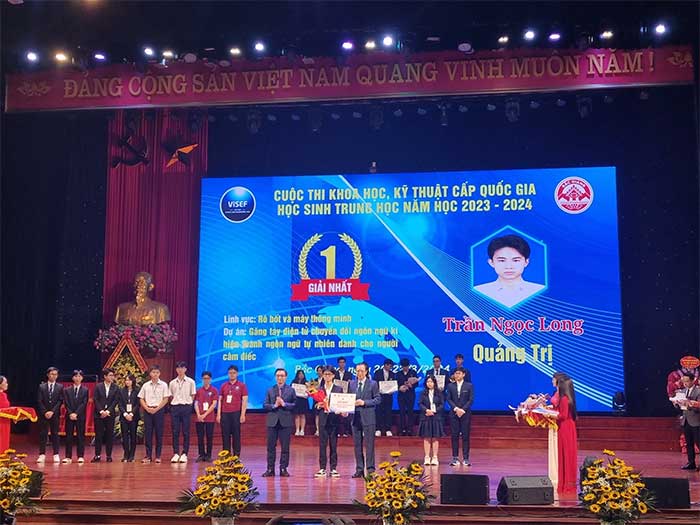
Tran Ngoc Long won first prize at the National Science and Technology Competition for his translation gloves project.
“I was developing the device following the paths of previous products, and the more I developed, the more errors occurred, making it impossible to create a device that met my goals. I felt stuck and in a state of crisis, contemplating giving up,” Long reflected.
With encouragement from his mentor, he boldly changed direction and opted for a completely new approach. Tran Ngoc Long managed to overcome these challenges by integrating drift correction technology through a deep learning model to accurately plot trajectories on the IMU module—equipped with spatial trajectory sensors.
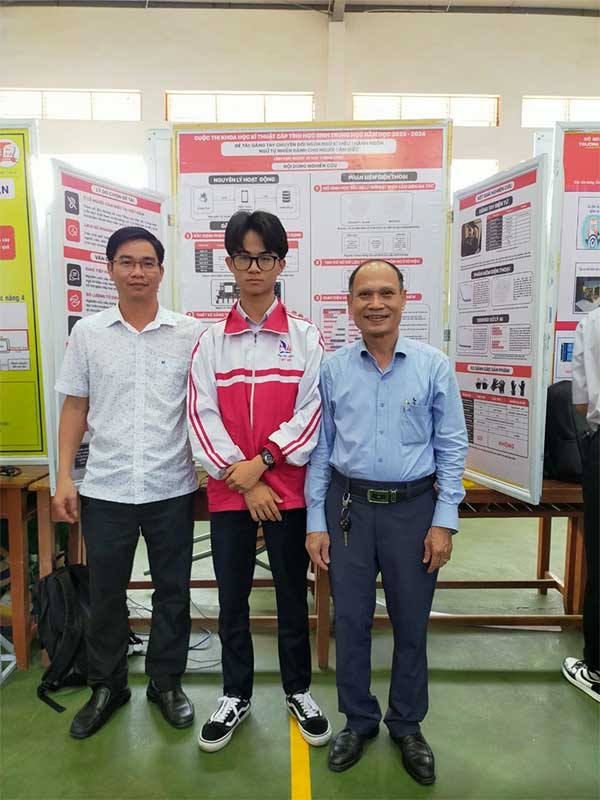
Teacher Ho Van Lam (left), Long’s project mentor, alongside the principal of Le Quy Don Specialized High School, taking a commemorative photo at the provincial Science and Technology Competition.
Gradually, Long’s translation gloves improved in performance. The project “Translation Gloves for Converting Sign Language to Natural Language for the Deaf and Mute” won first prize at the National Science and Technology Competition and will participate in the selection round for the International Science and Technology Competition to be held in the United States this coming May.
“I believe success requires sacrifice and trade-offs. Even though I did not achieve excellent student status this past semester, I still feel very proud and hope that one day my product will enable the hearing impaired to communicate easily. This way, they can learn, acquire knowledge, and contribute to the development of our nation,” Tran Ngoc Long concluded his story with the reporter.
















































